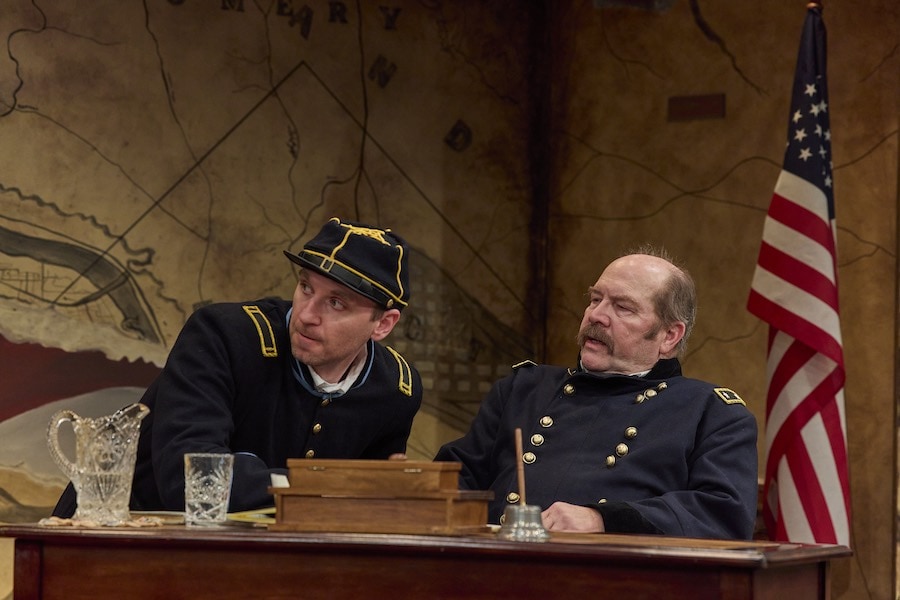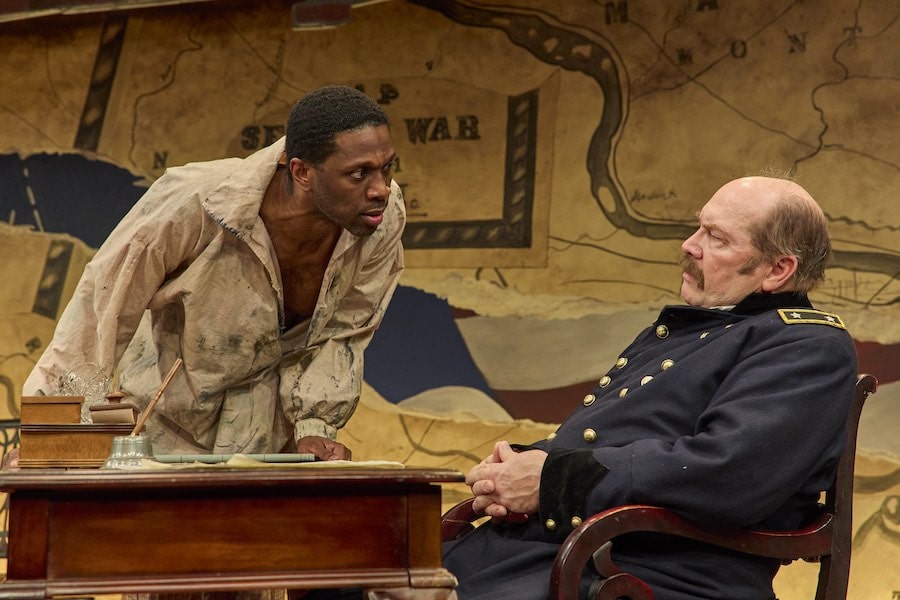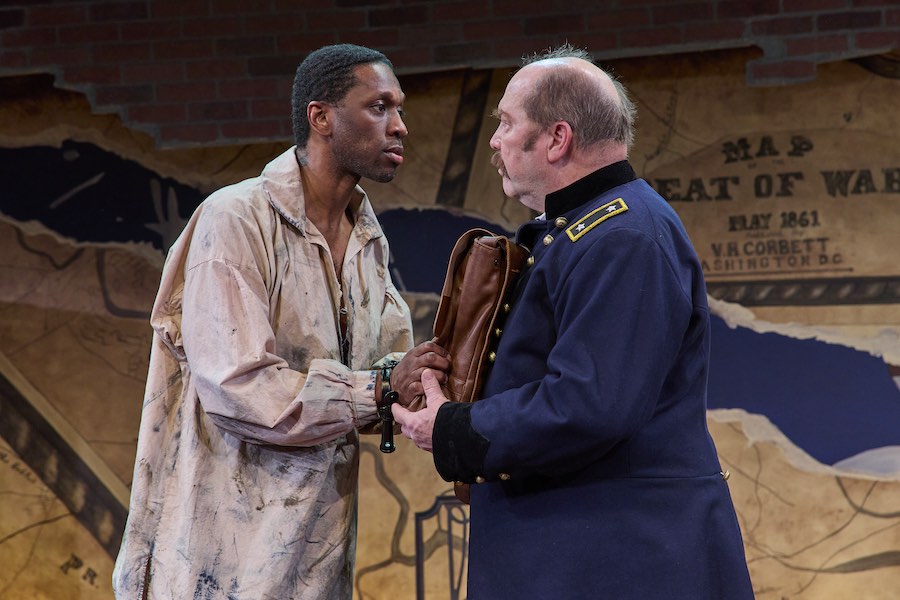It’s hard to imagine a comedy that takes place during the Civil War, but that’s exactly what Richard Strand’s Ben Butler is. Director Kasi Campbell (The Dazzle, Rep Stage), a Helen Hayes Award winner, has brought a woman’s perspective to this all-male play. She evokes marvelous performances from her cast, whose charms and foibles are apparent from the start.
The flawed and self-aggrandizing Benjamin Franklin Butler (1818–1893) was a controversial figure. But his successes were notable; he was a member of Congress and governor of Massachusetts. As a major general in the Union army, he supported and led Black troops; Charles Remond Douglass, the youngest son of Frederick Douglass, served under him, and he was the first person to give the Congressional Medal of Honor to a Black soldier, Christian A. Fleetwood. He was an advocate of rights for the Black community, for women, for anyone who was discriminated against, poor or oppressed.

As Ben Butler the play begins, it is 1861. Virginia has just seceded from the Union. Butler, a former lawyer, is settling in as commanding officer at Virginia’s Fort Monroe. Three fugitive slaves, led by spokesman Shepard Mallory (Theodore Sapp), have arrived seeking sanctuary.
The role of Butler is a character actor’s dream, and Stephen Patrick Martin is ideally cast. He wins us over at once as he instructs West Point graduate Lieutenant Kelly (Yury Lomakin) on how he expects to be treated. One key point: he does not like demands. His initial reaction, on hearing that Mallory wants to see him, is far from positive.
BUTLER: Does he want sanctuary in this fort?
KELLY: Well, yes, but…
BUTLER: Then it’s not complicated at all. I can’t grant him that. It’s explicitly forbidden for us to offer sanctuary to runaway slaves. This issue has been decided already. And it has been decided by that rare group of men who are allowed to make demands on me. By the president and his cabinet, by every general who outranks me, and, by the way, my wife happens to agree with them. I don’t see how I can go against that.
Martin’s gruffness is shrewdly persuasive, and Lomakin’s expressions as he struggles to manage upward are strikingly clever and comic. Lomakin perfectly captures the dilemma of the intelligent subordinate who endeavors to calculate just how far he can go with a temperamental boss.

Theodore Sapp as Shepard Mallory and Stephen Patrick Martin as Major General Benjamin Butler in ‘Ben Butler.’ Photo by DJ Corey Photography.
The stakes become infinitely higher when Shepard Mallory (Theodore Sapp) enters and asks for Butler’s help. Mallory is more than a match for the grumpy general. And it turns out they have much in common.
BUTLER: You are an arrogant oddity.
MALLORY: So are you. And I hope you know, when I say that, I mean no offense.
BUTLER: You are very nearly insane.
MALLORY: Well, sir, don’t make me say it but…
BUTLER: I can’t think of a single way in which I am anything like you.
MALLORY: You’re scared and overly confident all at the same time.
BUTLER: I’m not scared.
MALLORY: I think you are. I think the idea of this war scares the devil and all of his friends right out of you. But you balance that fear with being overly confident. I do that too! It’s that confidence—that arrogance—that makes it possible for you to be a major general. I believe, if I was white, I’d be a major general too.
Sapp’s performance has intellect, boldness, and deep conviction. He also shows us, in excruciating detail, the behavioral attitudes he is forced to adopt to avoid threatening Butler and endangering his own survival. And he finds the moments of humor that lurk under the tragedy.
Steven Carpenter (Washington Stage Guild associate artistic director) plays Major John B. Cary, who comes to retrieve Mallory and his friends for their owner (also named Mallory), a colonel of the Sovereign State of Virginia. Cary’s discomfiture is palpable as Butler cleverly utilizes his lawyer’s skills to outwit him at every turn. It is a classic example of what happens to an entitled male when challenged by another entitled male who has the temerity to care about the rights of others. The novel solution that Butler found to save the situation became a boon to other fugitive slaves of the time.
The play is set in Butler’s office (scenic design by Megan Holden) complete with flag, desk, books, and moving boxes against an evocative mural of a torn map. It has a comfortable period feel and historical resonance. Sígrid Jóhannesdóttir’s costumes, from the men’s uniforms to Mallory’s ragged ensemble, complement the setting. Neil McFadden is sound designer, Marianne Meadows is lighting designer, and Dr. Sharita Thompson is historical advisor. All aspects of the production are executed with professionalism and flair.
It must be said that the historical Butler was at times not immune to the racist prejudices of his day. He was hated by some; charged with harshness, incompetence, and corruption (which was never proved). Said Butler in 1883: “God made me in only one way. I must be always with the underdog in the fight. I can’t help it; I can’t change, and upon the whole I don’t want to.”

Theodore Sapp as Shepard Mallory and Stephen Patrick Martin as Major General Benjamin Butler in ‘Ben Butler.’ Photo by DJ Corey Photography.
Like the movie The Help, the play Ben Butler is, in a sense, a White Savior narrative. The Black character, as self-aware as he is, and as conscious as he is of the irony of his enforced deference to white authority, is still enslaved. Perhaps this is a flaw. But even so, Ben Butler is an excellent piece of theater.
The play recognizes the contribution of a contradictory, brilliant, and stubborn personality. It was said of Butler: “The white South hated him. The Black South loved him.” Neither history nor the play provides a final answer.
Running Time: 90 minutes, with no intermission.
Ben Butler plays through April 16, 2023, presented by Washington Stage Guild performing in The Undercroft Theatre at Mount Vernon Place United Methodist Church, 900 Massachusetts Avenue NW, Washington, DC. Tickets ($50–$60, with half off for students and $10 off for seniors) can be purchased online.
COVID Safety: All patrons must wear masks at all times while in the theater. Washington Stage Guild’s complete Health and Safety Policy is here.
Ben Butler by Richard Strand
Directed by Kasi Campbell
Cast
Major General Benjamin Butler – Stephen Patrick Martin
Shepard Mallory – Theodore Sapp
Lieutenant Kelly – Yury Lomakin
Major John B. Cary – Steven Carpenter
Design Team
Megan Holden, Scenic Designer
Sígrid Jóhannesdóttir, Costume Designer
Marianne Meadows, Lighting Designer
Neil McFadden, Sound Designer
Carl Randolph, Specialty Makeup
Arthur Nordlie, Stage Manager
Dr. Sharita Thompson, Historical Advisor




